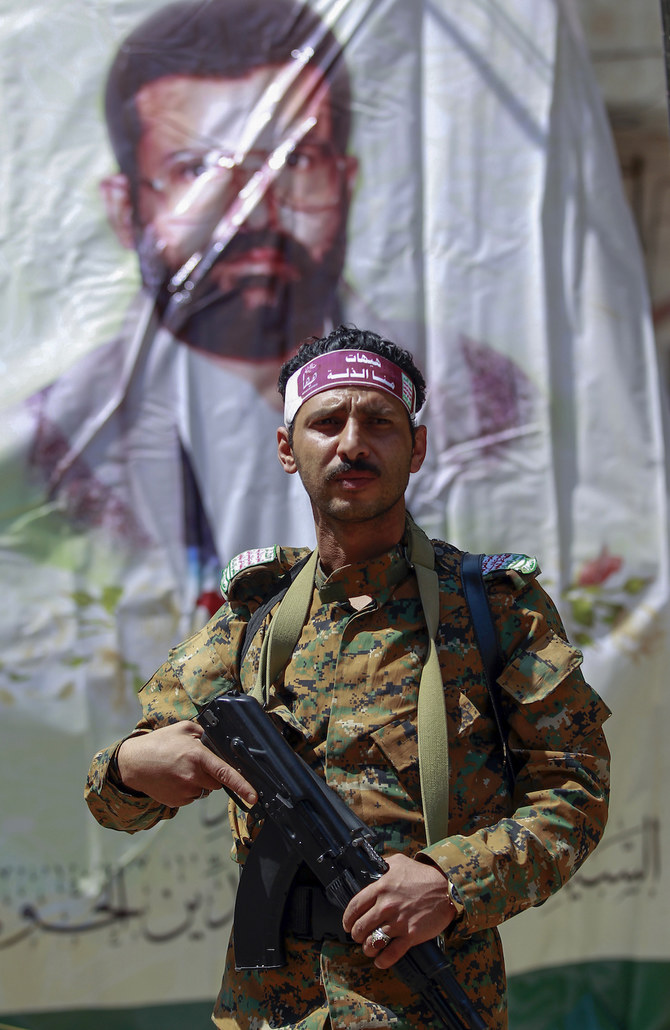CAIRO: Hussein Badreddin Al-Houthi, the eponymous founder of Yemen’s Houthi militia, gave a sermon on Jan. 17, 2002, in which he coined the slogan “God is greater, death to America, death to Israel, curse on the Jews, victory to Islam.” It is a slogan that the Houthis, known formally as Ansar Allah, say should not be taken literally, yet has gained currency among the militia’s members since Hussein Badreddin’s death.
Abdul-Malik Badreddin Al-Houthi, who became Ansar Allah’s leader following his brother’s death in 2004, is known to be the mastermind behind the group’s bloody insurgency and the 2015 capture of Sanaa. Abdul-Malik has long espoused Hussein Badreddin’s toxic opinions, including his antipathy towards America, Israel and the Arab states he viewed as collaborators of the West.
And yet, despite the obvious extremist overtones of the slogan, echoing the venomous rhetoric of Al-Qaeda and the Taliban, Joe Biden’s new US administration has chosen to scrap the Houthis’ label as a foreign terrorist organization — a designation it was given just days before the Trump administration left office.
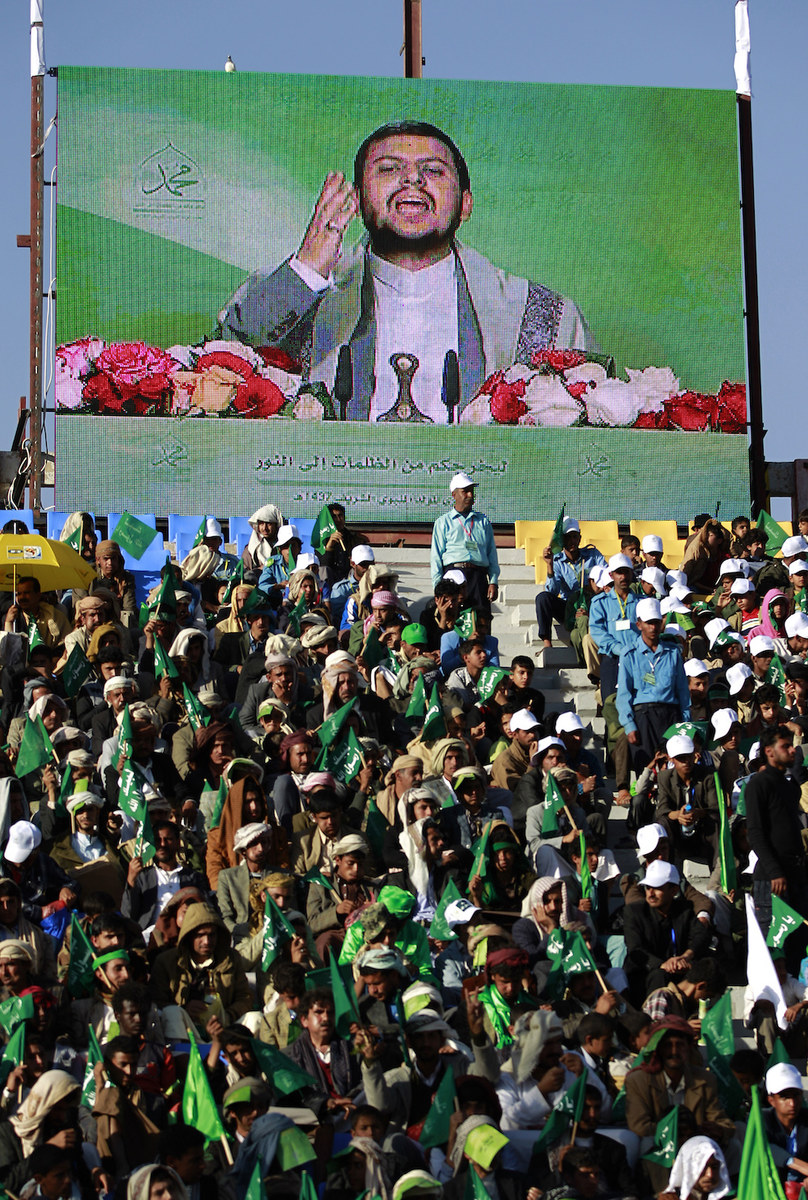
A speech by Houthi leader Abdul-Malik Al-Houthi is screened at a football stadium in the Yemeni capital, Sanaa, on December 23, 2015. (AFP/File Photo)
This week it emerged that the Biden administration has gone a step further, sending negotiators to meet with Houthi representatives in Oman. The stated objective was to open avenues towards peace between the Iran-backed occupiers of Sanaa and the UN-recognized Yemeni government in Aden.
According to Reuters, Timothy Lenderking, the lead US envoy on the Yemen crisis, met with Houthi chief negotiator Mohammed Abdul-Salam in Muscat on Feb. 26.
With much of northwest Yemen on the brink of famine, and renewed US engagement with Tehran firmly on the cards, the new administration has made no secret of its desire to reach a non-military solution to the grinding conflict.
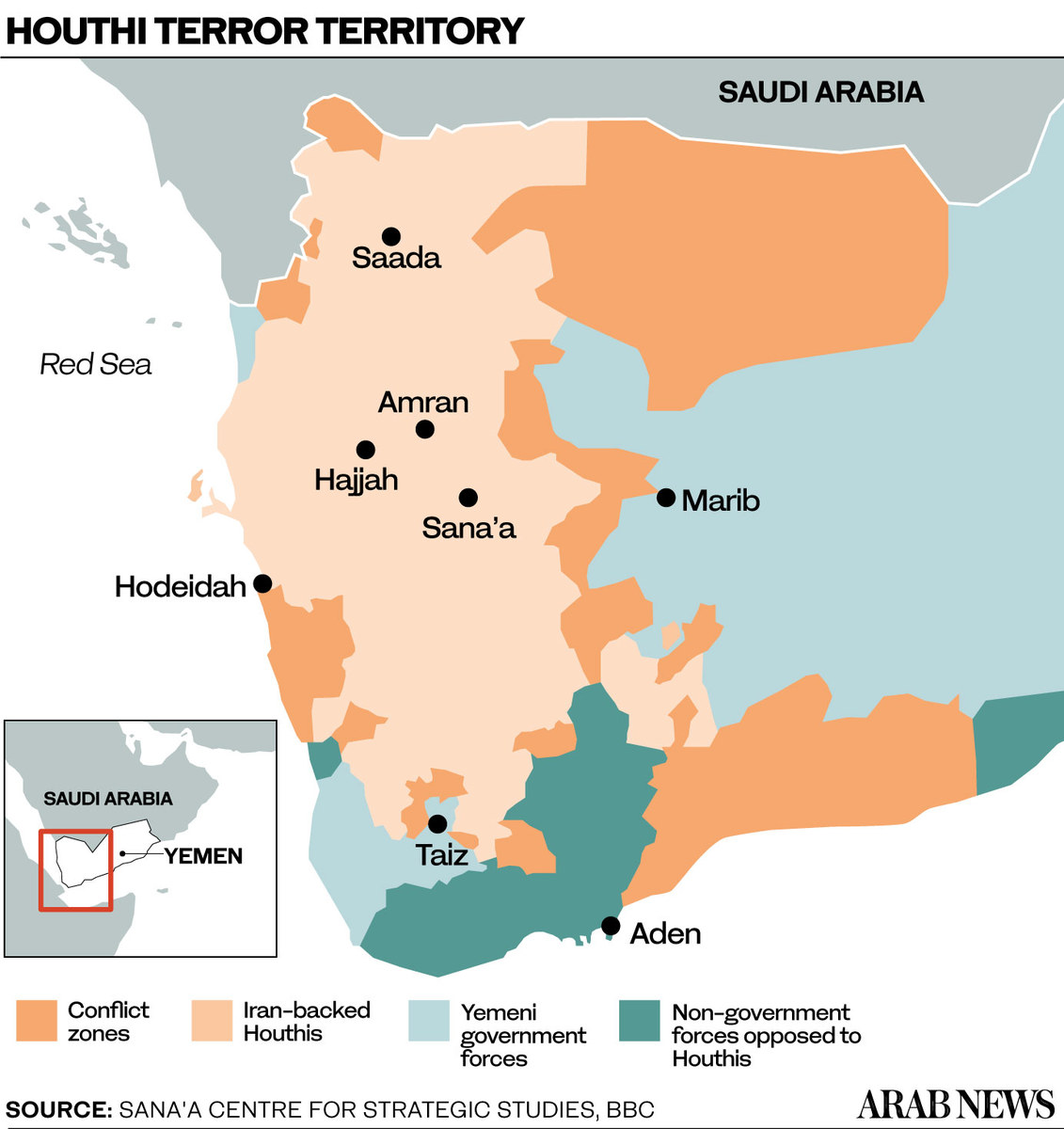
These talks are going ahead in spite of the fact that Houthi thoughts and actions reflect the very definition of a global terrorist entity — from its unapologetically open attacks on populated areas to its ideological fanaticism, well documented in its leaders’ sermons and writings.
As far back as March 8, 2002, Hussein Badreddin gave a sermon in Yemen’s northern Saada province calling for acts of terrorism against non-Muslims. In a pamphlet, titled “Terrorism and Peace,” he falsely claimed: “Muslims, this is what the Holy Quran states. Believers, you must do everything you can to terrorize the enemies of God.
“This is legitimate terrorism. But instead of talking about legitimate terrorism, we are the ones listening to the media and leaders, and allowing the word (terrorism) to echo in its American meaning and not in its Quranic meaning.”
In the same inflammatory sermon, Hussein Badreddin identified non-Muslims as the root of all evil and America as a terrorist entity.
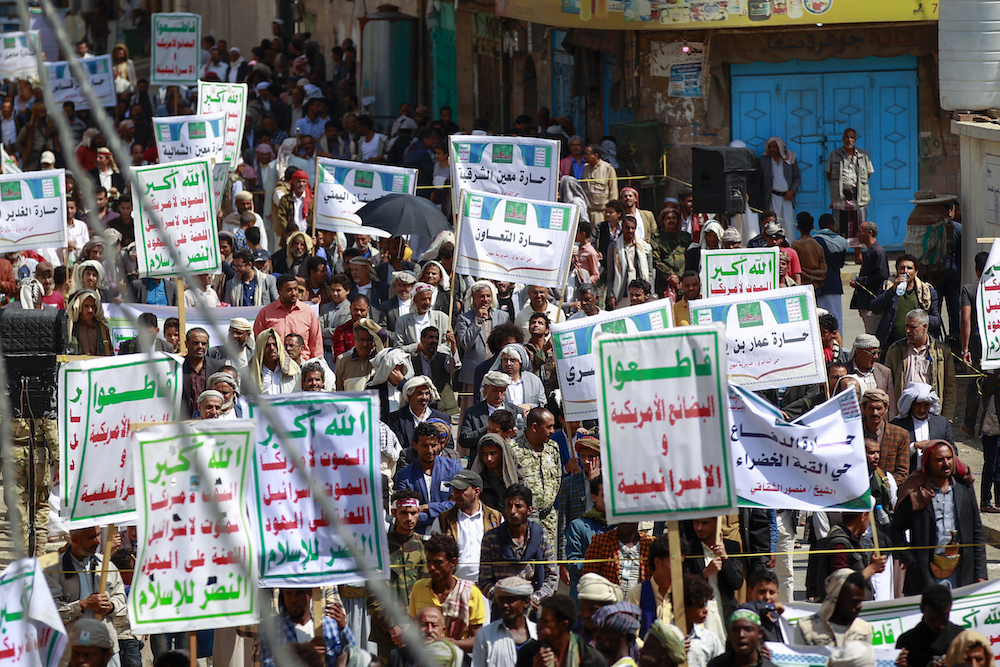
Yemeni supporters of the Houthi movement lit anti-US and anti-Israeli placards during a rally commemorating the death of Shiite Imam Zaid bin Ali in the capital Sanaa, on September 14, 2020. (AFP/File Photo)
“We must always talk about the Jews and the Christians just as God spoke about them in the Holy Quran, that they are the sources of evil, and those who have them are the sources of corruption, and that they are the ones who seek corruption on Earth,” he falsely claimed, arguing it is necessary “to firmly establish in the minds of Muslims that the US is a terrorist, that the US is evil, that Jews and Christians are evil so that they will not precede us.”
Hussein Badreddin also voiced virulently anti-Semitic views while criticizing Israel and displayed a puritanical attitude toward women’s education, dismissing the latter as a Zionist conspiracy against Muslims.
In another of his sermons, published in a December 2001 pamphlet titled “Who are we and who are they,” he sounded the false warning that educated women “will eventually learn how to become a woman that is far from giving birth to a true Muslim Arab, far from giving birth to and raising Muslim heroes. She will rather raise Zionist soldiers and give birth to a society and generations who will become their servants.”
In a December 2001 sermon, titled “Loyalty and hostility,” Hussein Badreddin made the baseless claim that confrontation with the West was a religious duty, because Jewish and Christian culture corrupted young Muslims: “When a person becomes corrupt, lets their children become corrupt, or corrupts others, they are considered recruiters for the service of the US and Israel, and the service of Jews and Christians. This proves their keenness to get what they want, and for their corruption to reach every house and every person, just as the devil wants. This is the devil’s plan.”

A security member loyal to the Houthi movement lifts his firearm during a demonstration in front of the closed US Embassy in the capital Sanaa, on January 18, 2021. (AFP/File Photo)
In many of his sermons and writings, Hussein Badreddin spoke highly of Iran’s Shiite theocracy and the Lebanese Hezbollah, which he once called “the most important masters of jihad in this world.”
Abdul-Malik, the current leader, is cut from the same cloth. Like his late brother, he has accused Gulf Arab states of aligning with the US and Israel. During a Sept. 20, 2020, sermon, he described the Abraham Accords, under which the UAE and Bahrain established formal diplomatic relations with Israel, as “an allegiance with the enemies of Islam.”
In another sermon a month earlier, Abdul-Malik recycled his brother’s false belief that jihad against the US and its allies is a sacred duty. To tell it in his own words: “Our stance in confronting the brutal American, Saudi, Emirati, Zionist aggression against our country is a principled stance on the grounds of our faith and religious affiliation. By virtue of our faith’s identity, it is a sacred jihad, a religious, human and patriotic duty, and whoever disregards this duty, or betrays this stance, they are then betraying and misusing their faith’s identity.”
On Jan. 3, 2020, then-US President Donald Trump authorized the assassination of Qassem Soleimani, the Iranian commander of the Islamic Revolutionary Guard Corps (IRGC)’s extraterritorial Quds Force, and Abu Mahdi Al-Muhandis, chief of Iraqi’s Shiite paramilitia group Kataib Hezbollah. The two men were killed in a US drone strike as their convoy left Baghdad airport.
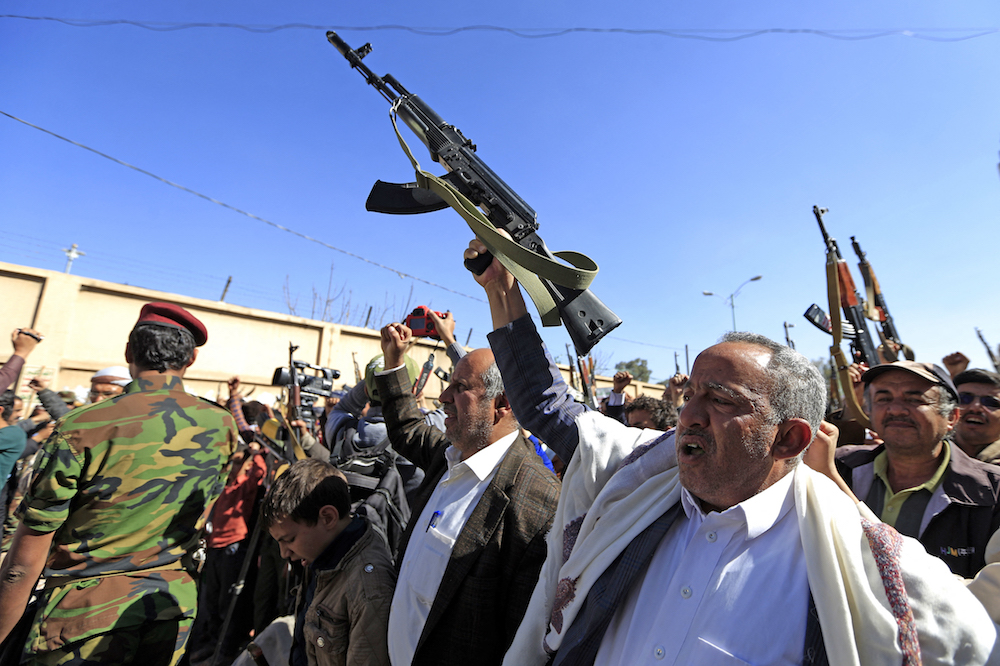
Houthi supporters gesture as they chant slogans during a demonstration against the outgoing US administration’s decision to designate the Iran-backed rebels as terrorists, in the capital Sanaa on January 20, 2021. (AFP/File Photo)
Tehran and its Iraqi proxies have since hit back with rockets and ballistic missiles aimed at US-led coalition targets in Iraq, killing several Western military personnel and civilian contractors and further destabilizing the country.
In a sermon delivered on Aug. 20, 2020, Abdul-Malik was unstinting in his approval of the indiscriminate attacks, saying: “We commend the escalation of the resistance operations against the American presence in Iraq.
“At this late stage, the Americans wanted to return to Iraq, to establish their colonizer status again, and to take charge once more. Matters have escalated after their heinous and dreadful crime of assassinating the two martyrs Qassem Soleimani and Abu Mahdi Al-Muhandis in Iraq.”
Unsurprisingly, the Houthi slogan, “God is greater, death to America, death to Israel, curse on the Jews, victory to Islam,” has the same violent ring today as it did when Hussein Badreddin coined it in January 2002 — just four months after Al-Qaeda’s 9/11 attacks on the US.
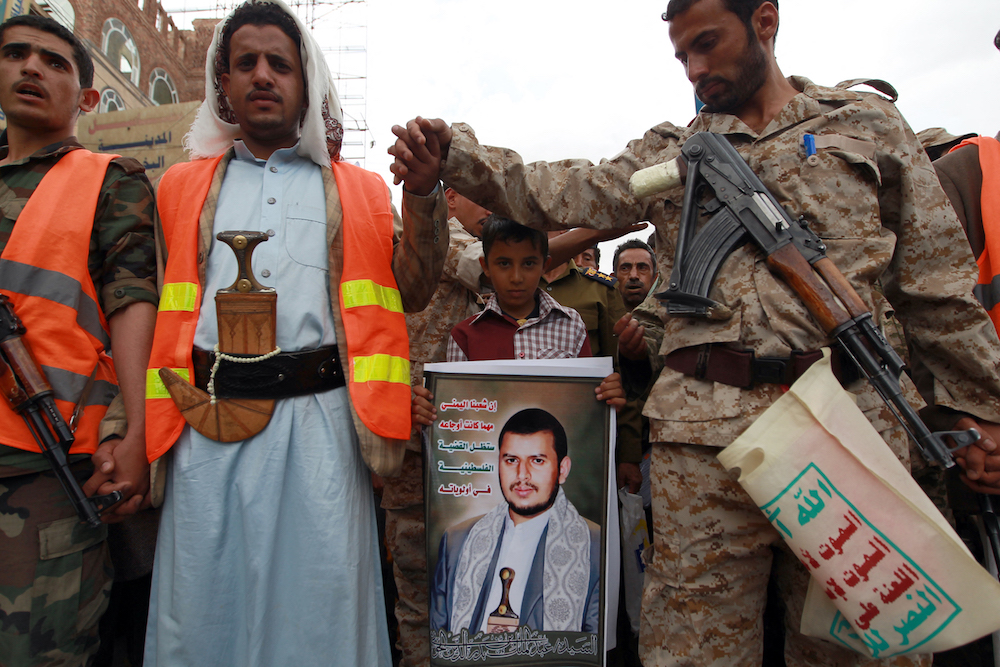
A child holds a banner showing the Houthi leader Abdul-Malik Al-Houthi during a demonstration of his supporters to mark the fourth anniversary of the "Friday of Dignity" attack on March 18, 2015 in Sanaa. (AFP/File Photo)
Marking the anniversary of the slogan’s first public utterance, Abdul-Malik reminded the Houthis that it was his late brother’s contention that hostility towards Jews and Christians was a religious imperative.
“The Holy Quran provided us with an accurate, precise, real, and certain assessment of our enemies represented by the team of evil, treacherous, deceptive, hateful and hostile people of the book (Jews and Christians),” Abdul-Malik said, trying to justify the havoc Iran-backed militias have caused on religious grounds.
“Their plans, stances, provisions, and methods, will be based on the premise that they do not wish us — the Muslim community — well.”
As the US re-examines its stance on Iran and its radical Shiite proxies throughout the Middle East, the belief that sanctions relief, negotiations or alternative designations can get the Houthi leadership to change its spots seems delusional at best and dangerous at worst.


